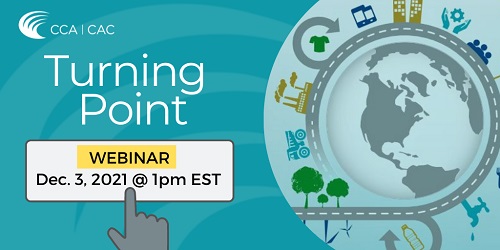Canada consumes materials, energy, and water at some of the highest rates in the world. Only 6% of materials entering the economy come from recycled sources, while almost three-quarters of what we use is wasted. According to a new expert panel report from the Council of Canadian Academies (CCA), Canada may be throwing away significant opportunities and potential wealth along with all that waste. In a move to a circular economy, the value tied up in waste could help Canada remain economically competitive while meeting its commitments to reduce greenhouse gas emissions and achieving sustainable development goals.
The transition away from our current linear “take-make-waste” economy will require widespread systemic changes and cooperation across entire supply chains but is necessary because the world is already using more resources than the planet can provide. Tens of billions of tonnes of materials are used or consumed yearly worldwide. Extracting and processing these resources contributes to biodiversity loss, water stress, and pollution, including greenhouse gas emissions. Only a small portion of materials are ever cycled back into the economy, resulting in a massive loss of value. Beyond the environmental and economic impacts, this waste contributes to social inequalities, such as the disproportionate exposure of marginalized communities to pollution.
“In a circular economy, products and materials are used for longer, through repair, remanufacturing, and other strategies,” said Tima Bansal, FRSC, Chair of the Expert Panel. “A circular economy will create economic value, a healthier environment, and a more just society. Yet it requires transformative, system-wide change, and can only be achieved by moving forward incrementally and involving everyone.”
In Canada, inexpensive landfilling and virgin materials, and the perception of abundant resources and space, create an economic disincentive to reduce waste and find a secondary use for materials. To adjust economic incentives to favour circularity, governments can use financial levers including procurement of circular products and services, taxing waste and pollution rather than labour, and investing in circular infrastructure and R&D.
Despite growing public awareness of the costs of overconsumption, individual behaviour change is insufficient to direct this transition. However, education, public awareness, and skills training will help to support the transition towards a CE and encourage participation from consumers and producers.
“Turning Point outlines the potential benefits of transitioning away from a standard linear economic model to a more circular one,” said Eric M. Meslin, PhD, FRSC, FCAHS, President and CEO of the CCA. “The circular economy is a paradigm example of a multi-pronged approach that will necessitate participation from all sectors, including governments, businesses, and civil society.”
Environment and Climate Change Canada asked the CCA to examine the potential opportunities and challenges for a circular economy in Canada.
Turning Point provides an overview of the circular economy and its current state in Canada, including some of the tools and approaches for measuring it in practice, and for the first time ever, estimates a circularity rate for Canada.

We invite you to attend a public briefing and discussion about the report on December 3, 2021 at 1pm EST. This event will be hosted by ECCC, in partnership with the CCA, as a World Circular Economy Forum (WCEF) side event.
ABOUT THE EVENT
During this 90-minute webinar, members of the Expert Panel will share the report’s high-level findings and discuss key issues related to the transition to a circular economy in Canada. The event will be moderated by David Hughes, President and CEO of The Natural Step Canada. Speakers will include representatives of CCA and ECCC, as well as four members of the Expert Panel. This event is an opportunity to build on the momentum gained during WCEF2021, hosted by Canada and co-organized by ECCC with the Finnish Innovation Fund Sitra in September 2021, and to accelerate a circular transition in Canada. Join us to learn more about the key actions needed to create the conditions for long-term success on the path towards a thriving circular economy. More information about this event can be found HERE.